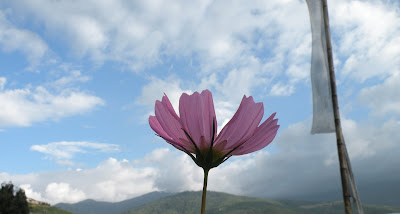“Citizenship is an
articulation of an inclusive political association and common culture that
unites all inhabitants of diverse ethnicity, religion or race…The state is an
association of citizens, all free and all have the same rights and carry
respective duties.”
-Feliks Gross (1999), the American
Sociological Humanist
The Bhutanese
public was, to a large extent, primarily conservative, traditional and
apolitical. Bhutan’s transition was initiated, planned and controlled solely by
the Kings. There was neither external pressure from the outside world on Bhutan
to democratize, nor have there been any internal demands for greater
participation for the people. However, since 1998 the fourth Druk Gyalpo King
Jigme Singye Wangchuk guided the country to rapid transition to democracy.
Every major activity was geared towards people empowerment, decentralization
and people’s participation. And in 2008, the country became a constitutional
democratic monarchy.
With democracy
gifted from the royals, the Bhutanese publics are bestowed with greater, newer
and important rights and responsibilities to determine our own political,
economical, social and cultural system. From apolitical, passive and dependant
populace we are driven to active, well formed and responsible citizens.
The Constitution
of the Kingdom of Bhutan was adopted and it has granted certain legal and
fundamental rights to all its citizens like freedom of speech and assembly,
rights to press, property rights and to one’s own religion and culture.
Also, certain social and political responsibilities have been granted
such as rights to participate in the exercise of political power-whether as a
voter, a candidate or public officials.
However,
citizenship is more than this in a new democratic Bhutan. It is encompassed by
normative principles, values and expectations that all derive from social,
economical, historical and cultural context of the times. It is a higher
responsibility to live united and achieve everything as one harmonious family.
On the National
Day, His Majesty the King Jigme Khesar Namgyal Wangchuk declared to the nation:
“Today we have great aspirations-the peace, stability, security and sovereignty
of the nation; strengthening of our new democracy; equitable socio-economic
growth to achieve GNH and; nurturing our youth to one day lead a nation greatly
strengthened by our hard work and commitment. To achieve all this we need trust
and faith in our relationships-between the government and people; between
institutions of government and; between people ourselves.” It is very clear
from the National Day’s address that the concept of citizenship in a democratic
Bhutan is to promote cooperative living. Individuals or groups or agencies with
different interests and opinions are obliged to sit down with one another, have
dialogue, negotiate and support each other.
In 2008, we elected
the government which serves the people. But the citizenship role is much
broader than just taking part in the democratic processes and choosing leaders
to foster vibrant democracy.
As Marina
Liborakina, a Russian activist stated, “As citizens, we are responsible for how
we are governed. The main issue is…to broaden citizens’
participation…especially in decision making on crucial issues of security,
peace, and military.” Citizenship, thus, means a right to participate actively
in public management which is of great significance for our country which is in
the process of creating a modern, political and economic system. Well informed,
adequately and timely consulted citizens taking part in the direct
decision-making can fully contribute to sharing of responsibilities with the
representatives, planning and working together.
Debating public
issues, attending community meetings and petitioning the government are some
other rights and responsibilities of the citizens. Public debate provides an
opportunity for every individual to discuss all local issues and to critically
re-examine them for the purpose of finding adequate solutions. Moreover,
non-governmental organizations can assist the government offering citizens
especially members of sensitive groups such as youth, women and disabled person
a platform to voice their concerns and include them into the governmental
process.
Besides, social
media networks such as Facebook, Twitter and blogs are further facilitating the
citizens’ freedom of speech. It provides accessible channels for the citizens
to take active part in the governance of their country where people voice their
opinions on development and raise pertinent questions for the exchange of
knowledge and experience on development issues.
To define and
limit the government’s power and hold them accountable, the Constitution and
other constitutional bodies like the Election Commission of Bhutan and the
Anti-Corruption of Bhutan are established.
In general,
citizenship demands us to be concerned and to care about the world around us
and then act on the problems. From nurturing our environment, protecting it
from exploitations, we are to raise issues relating to negligence of
underprivileged and fighting against indiscriminate and injustice in our society.
We have duties and the responsibilities to care and respect for other fellow
citizens, their cultures and ideas. As we love our country and abide by law, in
return the state upholds its right to defend our rights.
However,
citizenship is not limited to one’s country. We are also the citizens of the
international community as we have been bestowed with human rights and a voice
in international matters that affect us. We have responsibility to care about
other citizens of the world and to have an understanding of their cultures,
histories and ideas. In a global world, we live in an interconnected world with
crucial transnational dimensions and it is citizens’ responsibilities to be
informed on how geopolitical realities shape life today.
In conclusion
citizenship is a common culture that unites all the citizens of diverse
ethnicity, gender, religion and interests where they have the same rights and
respective duties to carry irrespective of who we are. Citizenship builds a
strong civil society (even global) marked by harmony, understanding,
cooperative living and trust to achieve our aspirations and find peace,
economic prosperity and GNH.











